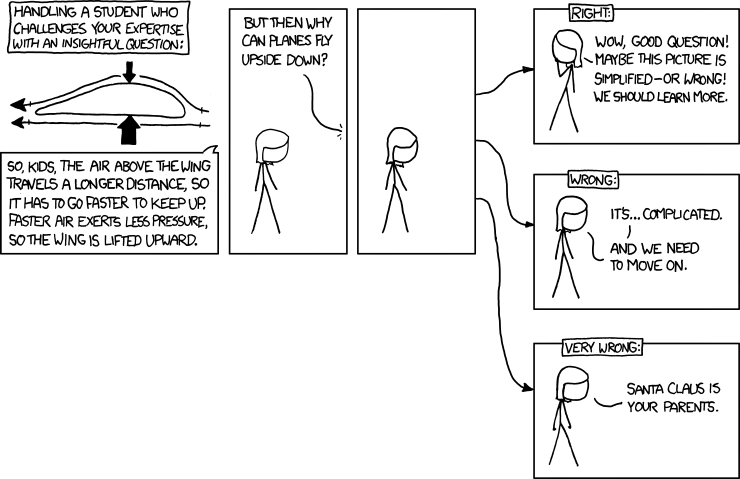 Adjutant Stormy, on 01 October 2010 - 01:22 AM, said:
Adjutant Stormy, on 01 October 2010 - 01:22 AM, said:
What makes a good teacher GREAT?
Personally, the hallmark of the best teachers I've had through school and undergrad, surprisingly enough, was simply the ability to say "I don't know" (preferably followed by "let's find out" / "I'll get back to you" / "what do you think?") and not bullshit me around, or refer me to the book, or otherwise deflect. The teachers confident enough in their element that they can admit failure, but not give up.
I couldn't agree more. I've seen plenty of the bad teachers do the "read the book again" answer when questioned.
I would also add that the ability to make the students care about the subject is special. And when students actually care about what they are studying, they will invariably do better. I wish i could have had an Irish language teacher that could have inspired me, since it's my greatest regret not being able to speak it fluently when i left school. I just couldn't see the point and my teacher was just going through the motions. I was told repeatedly in school that i was crap at languages, and yet I was subsequently able to achieve a degree of fluency in French, Irish and Spanish and have decent comprehension of spoken Japanese. Now if i could find the motivation to learn these in my own time, how come none of my teachers could inspire this in me when i was a pretty willing student.
My only personal experience of teaching came from teaching field ecology courses to high school students and they were great. However these were in an atypical situation as we were external teachers, and the kids were outdoors. We still had to deal with student apathy, kids trying to show off/impress their friends, and not caring about the subject. My ways of getting them to participate varied on the students, but a good starting point was to explain that if they paid attention, these would be the easiest marks they'd get all year, and that because they were doing stuff with their hands in addition to the books, they'd be much more likely to remember the stuff in an exam situation. which is true.
I also liked to point out that we were outdoors, and that surely made a nice break from the classroom? My only "tough" rule was that you weren't to interfere with other people/groups and their ability to do the work. Also, having had real world experience of using the various surveying techniques and explaining their use seemed to help. I found that if you could relate what we were doing, however silly it seemed, to a real world application, they were more likely to accept it and join in. I often had the "real" teacher remark how amazed they were at the participation levels on our courses.
Now i realise that this is not the same as a classroom, and that is one of the main reasons i couldn't be a teacher. I like educating people, but the rigid school system frustrates me. But being able to recognise that not all students respond the same way is a good place to start.
as an example, my french teacher had previously taught my sister, and treated us the same way, by basically belittling our work in an attempt to get us to work harder. now my sister would get bloody-minded and set out to prove the teacher wrong (and hence do better). I, on the other hand, was genuinely trying my best, and couldn't understand why i was being picked on. So i just got irritated and eventually had a blazing row with the teacher (which i won, surprisingly). But it had got to the point that i was going to another french teacher after school and she couldn't understand why i was being marked so low. Now I still think that french teacher was generally a very good educator (and her students typically did well in the state exams) but I'll always wonder how good she could have been with better personal skills.

 Help
Help





















